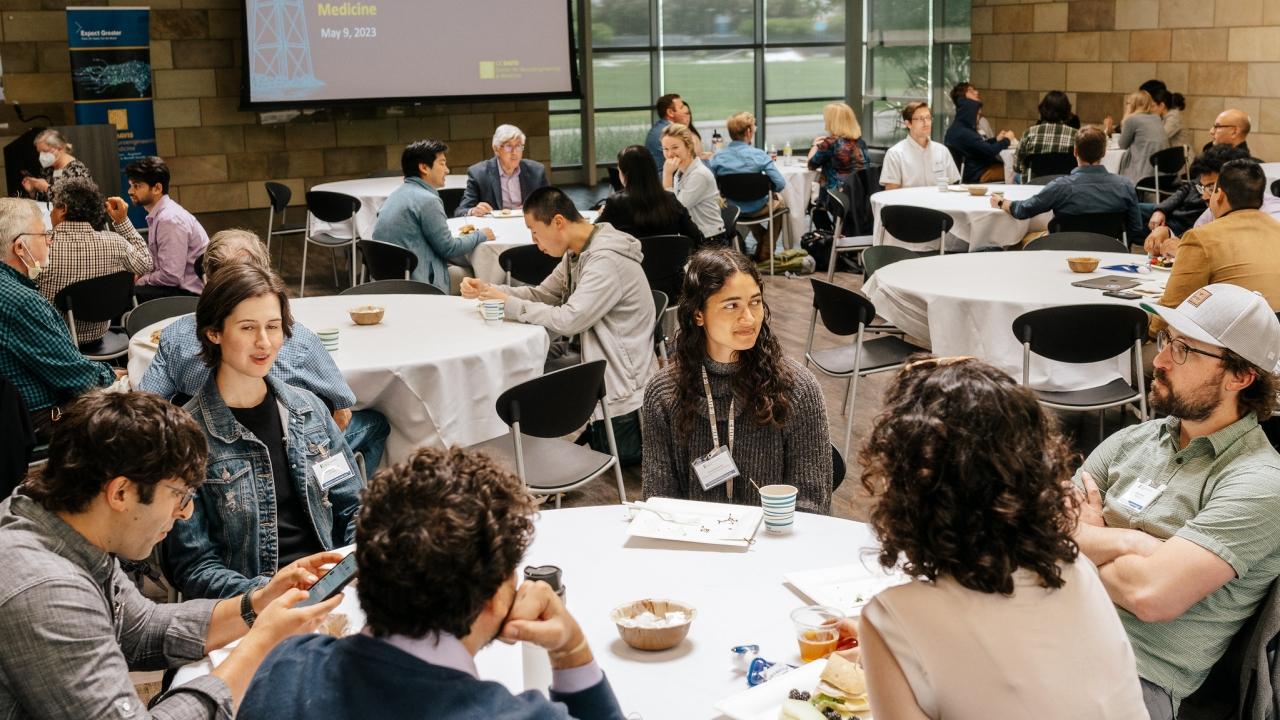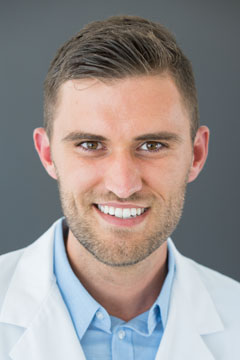
Blogs: Center for Neuroengineering and Medicine Research Symposium Offers Stepping Stone to Growth in the Field
A supportive community offers opportunities to learn and grow in neuroengineering
Quick Summary
- Students share their perspectives about the annual research symposium of the Center for Neuroengineering and Medicine

Hi, I'm Greg.
My name is Greg Disse, and I am a third-year medical student in the UC Davis MD/PhD program. A few weeks ago, I completed my PhD in Neuroscience where, under the mentorship of Dr. Karen Moxon, I analyzed neural signals generated by populations of neurons in the cerebral cortex during movement and investigated how those signals change after spinal cord injury.
Neuroengineering often feels like science fiction. Engineers, neuroscientists, clinicians, computer scientists, and ethicists come together to use technology to treat or even cure debilitating neurological conditions in ways we could not even imagine two decades ago. On May 9, the UC Davis Center of Neuroengineering and Medicine hosted its 2nd annual research symposium, bringing together researchers, clinicians, and trainees to showcase the exciting research being conducted at both the Davis and Sacramento campuses.
I was drawn to neuroengineering while pursuing my undergraduate neuroscience degree at UCLA. A functional neurosurgeon was giving a guest lecture on movement disorders. He shows a video of 39-year-old musician with a debilitating tremor playing a guitar in the operating room while the surgical team actively implants a stimulating device deep in his brain. Almost instantly, his motor skills improve. I recall sitting in that lecture hall completely mesmerized. This lecture, combined with subsequent experiences working in labs that studied neuromodulation for the treatment of depression, epilepsy, and traumatic brain injury, inspired me to pursue a career in neuroengineering.

I was extremely excited to participate in the inaugural research symposium last year. Not only did I get the chance to present my work, but I had the opportunity to explore the work being conducted by the ever-growing neuroengineering community at UC Davis as well as by our neighbors at the Lawrence Livermore National Laboratory. Unlike many other events we attend as trainees, the Center’s symposium largely showcased the work of its graduate students and post-docs – from poster presentations to full talks. I strongly recommend this event to trainees of all levels, even those just starting their graduate training as it will introduce the breadth and depth of neuroengineering topics explored across the campus.
For me, the most exciting and rewarding part of neuroengineering is that this field primarily aims to improve the quality of life of individuals afflicted with various neurological and psychiatric conditions. Last year’s inspiring keynote address perfectly demonstrated this idea. Dr. Leigh Hochberg, the director of the BrainGate Consortium and Clinical Trials, gave a fascinating overview into how burgeoning brain-computer interface technologies have started to return some degree of motor function to trial participants suffering from spinal cord injury, amyotrophic lateral sclerosis, and other debilitating conditions. Especially with UC Davis as a newer addition to the BrainGate Consortium, I am excited to see where this work will lead.
From monthly research seminars and student talks, to journal clubs and informal lunches with guest speakers, the Center for Neuroengineering and Medicine offers its trainees many opportunities to gain exposure to the exciting field of neuroengineering while also allowing for networking and camaraderie. For me, these experiences continued to inspire me to pursue a career as an MD/PhD neuroengineer. This 2nd annual symposium celebrated the work completed across the UC Davis campuses over the last year while also affording students important opportunities to network, socialize, learn, and become inspired by such an exciting and rewarding field of research.

Hi, I'm Anna Rita
I received my Bachelor of Science in mechanical engineering from the University of California, Davis in 2020, just as the pandemic shut everything down. Wanting to get a second chance at a commencement ceremony at UC Davis, I applied to the Master of Science program in mechanical engineering and joined professor Jonathon Schofield's Bionic Engineering and Assistive Robotics, or BEAR, Lab. I will graduate with my M.S. degree this June 2023.
My path to and passion for neuroengineering have been nurtured by a love of robotics, a background in dance and a supportive community of researchers, educators and students.
Neuroengineering Trainees Awards
- Best Oral Presentation Award (and $1,000): Ariana Moghbel, MD/PhD student and NSF NRT NeuralStorm Fellow
- Best Lightning Talk Award (and $750): Anna Rita Moukarzel, MS student in prof. Schofield's Bionic Engineering and Assistive Robotics Laboratory
- Best Poster Award (and $500): Peyton Young, PhD student and NSF NRT NeuralStorm Fellow, prof. Schofield's Bionic Engineering and Assistive Robotics Laboratory
- 2nd Best Poster Award (and $250): Rocelle Evangelista, Junior Specialist, Dr. Sheela Toprani's lab
The Center for Neuroengineering and Medicine is one such community, and their annual research symposium has proven to be a transformative stepping stone to my growth as a scholar in the field.
At the center's inaugural research symposium in 2022, my experiences and interactions cemented my belief that I am in the right research area. It was an excellent professional development opportunity, and I was able to discuss awesome research with some of the greatest minds in the neuroengineering field.
I won the Best Oral Presentation Award for my presentation, “Establishing Target Muscle Reinnervation for the Prevention of Neuromas and Phantom Pain for Bionic Prosthesis Control.” I went on to present at the Society for Neuroscience Conference in San Diego.
The second annual research symposium was held May 9, 2023 (see this link for recordings). It offered an opportunity for graduate and undergraduate students, postdocs, junior specialists and other trainees to share their work relevant to neuroengineering in oral presentations, lightning talks and/or poster presentations.
I was selected to give a lightning talk and present my poster. I was fortunate to be recognized with the award for Best Lightning Talk.

As much as I enjoyed sharing my work, I appreciated learning from others, especially our new faculty and their new labs and research focuses. The keynote speaker, professor Victor Jirsa, concluded the event with a fascinating presentation about "The Virtual Brain in Applications to Medicine" (recording available at this link).
Jirsa is the director of the Inserm Institut de Neurosciences des Systèmes at Aix-Marseille-Université in Marseille, France. Jirsa's work has been foundational for network science in brain medicine and the use of personalized virtual brain models in epilepsy. He is the Chief Science Officer of the European Digital Neuroscience Infrastructure EBRAINS and Lead Investigator of the Human Brain Project.
I cannot wait for the next Center for Neuroengineering and Medicine Research Symposium. If you are interested in brain-computer interfaces, prosthetics and/or neuroengineering, the annual research symposium is a must-attend event to learn about new research and join a growing community.
